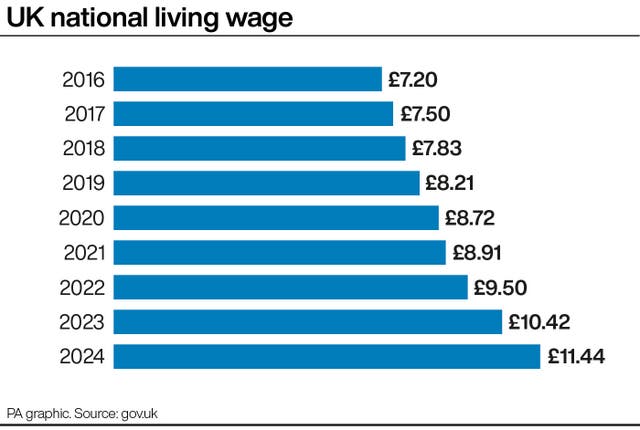The national living wage will rise to £11.44 in April next year, the Treasury has announced.
The rate is currently £10.42 for workers aged over 23, but the new figure will apply to 21 and 22-year-olds for the first time.
The national minimum wage for 18 to 20-year-olds will also increase by £1.11 to £8.60 per hour, the Government has said.
Apprentices will have their minimum hourly rates boosted, with an 18-year-old in an industry like construction seeing their minimum hourly pay rise by more than 20%, going from £5.28 to £6.40 an hour.

It will be the largest cash increase seen by the minimum wage and the first time it has gone up by more than £1, according to the independent Low Pay Commission (LPC) which advises the Government on the rate.
It means that the minimum wage will now be equal to two thirds of median hourly pay for those aged 21 and over, the LPC said.
Chancellor Jeremy Hunt said: “Next April all full-time workers on the National Living Wage will get a pay rise of over £1800 a year. That will end low pay in this country, delivering on our manifesto promise.
“The National Living Wage has helped halve the number of people on low pay since 2010, making sure work always pays.”
However, the TUC is calling for an increase to £15 an hour “as soon as possible,” citing real-terms cuts to pay over the last decade and the high cost of living.
“This is badly needed and follows pressure from unions and low-pay campaigners. But with bills sky-high the minimum wage should be raised to £15 an hour as soon possible,” general secretary Paul Nowak said.
“And let’s not lose sight of the bigger picture. Most working people’s pay packets have fallen in real terms for the last decade – the worst squeeze in earnings in more than 200 years.”
The Resolution Foundation think tank said that at least 1.7 million workers will benefit directly from the increase.
Nye Cominetti, principal economist, said: “The more than £1 an hour increase in the National Living Wage next year is huge – the third biggest rise ever in both cash and real terms. At least 1.7 million workers across Britain will benefit from this latest rise, and many more will see their wages boosted indirectly.
“The minimum wage is one of Britain’s greatest ever policy triumphs – playing a key role in reducing low pay to a record low, and benefitting women and younger workers in particular.
“But it can’t be the only tool we use to improve people’s working lives. We now need to build on its success to drive up wider working conditions for low earners in terms of job security and access to holiday and sick pay.”
Further measures will be set out in Wednesday’s autumn statement, which is Mr Hunt’s main opportunity to make tax and spending announcements outside of the Budget.
Mr Hunt is aiming to cut taxes and boost growth in a bid to revive both the economy and the Tories’ election chances, with the Treasury already signalling a series of changes that will be in the speech.
These include a £320 million plan to help unlock pension fund investment for technology and science schemes, reforms to speed up planning for energy infrastructure and cut bills for those living near pylons, a drive to increase public sector productivity and a new “back to work” agenda to get people off welfare and into jobs.





Why are you making commenting on The Herald only available to subscribers?
It should have been a safe space for informed debate, somewhere for readers to discuss issues around the biggest stories of the day, but all too often the below the line comments on most websites have become bogged down by off-topic discussions and abuse.
heraldscotland.com is tackling this problem by allowing only subscribers to comment.
We are doing this to improve the experience for our loyal readers and we believe it will reduce the ability of trolls and troublemakers, who occasionally find their way onto our site, to abuse our journalists and readers. We also hope it will help the comments section fulfil its promise as a part of Scotland's conversation with itself.
We are lucky at The Herald. We are read by an informed, educated readership who can add their knowledge and insights to our stories.
That is invaluable.
We are making the subscriber-only change to support our valued readers, who tell us they don't want the site cluttered up with irrelevant comments, untruths and abuse.
In the past, the journalist’s job was to collect and distribute information to the audience. Technology means that readers can shape a discussion. We look forward to hearing from you on heraldscotland.com
Comments & Moderation
Readers’ comments: You are personally liable for the content of any comments you upload to this website, so please act responsibly. We do not pre-moderate or monitor readers’ comments appearing on our websites, but we do post-moderate in response to complaints we receive or otherwise when a potential problem comes to our attention. You can make a complaint by using the ‘report this post’ link . We may then apply our discretion under the user terms to amend or delete comments.
Post moderation is undertaken full-time 9am-6pm on weekdays, and on a part-time basis outwith those hours.
Read the rules hereLast Updated:
Report this comment Cancel